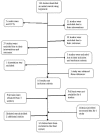Yoga on our minds: a systematic review of yoga for neuropsychiatric disorders
- PMID: 23355825
- PMCID: PMC3555015
- DOI: 10.3389/fpsyt.2012.00117
Yoga on our minds: a systematic review of yoga for neuropsychiatric disorders
Abstract
Background: The demand for clinically efficacious, safe, patient acceptable, and cost-effective forms of treatment for mental illness is growing. Several studies have demonstrated benefit from yoga in specific psychiatric symptoms and a general sense of well-being.
Objective: To systematically examine the evidence for efficacy of yoga in the treatment of selected major psychiatric disorders.
Methods: Electronic searches of The Cochrane Central Register of Controlled Trials and the standard bibliographic databases, MEDLINE, EMBASE, and PsycINFO, were performed through April 2011 and an updated in June 2011 using the keywords yoga AND psychiatry OR depression OR anxiety OR schizophrenia OR cognition OR memory OR attention AND randomized controlled trial (RCT). Studies with yoga as the independent variable and one of the above mentioned terms as the dependent variable were included and exclusion criteria were applied.
Results: The search yielded a total of 124 trials, of which 16 met rigorous criteria for the final review. Grade B evidence supporting a potential acute benefit for yoga exists in depression (four RCTs), as an adjunct to pharmacotherapy in schizophrenia (three RCTs), in children with ADHD (two RCTs), and Grade C evidence in sleep complaints (three RCTs). RCTs in cognitive disorders and eating disorders yielded conflicting results. No studies looked at primary prevention, relapse prevention, or comparative effectiveness versus pharmacotherapy.
Conclusion: There is emerging evidence from randomized trials to support popular beliefs about yoga for depression, sleep disorders, and as an augmentation therapy. Limitations of literature include inability to do double-blind studies, multiplicity of comparisons within small studies, and lack of replication. Biomarker and neuroimaging studies, those comparing yoga with standard pharmaco- and psychotherapies, and studies of long-term efficacy are needed to fully translate the promise of yoga for enhancing mental health.
Keywords: ADHD; alternative medicine; clinical trials; cognition; depression; meditation; schizophrenia; yoga.
Figures


Similar articles
-
Systematic reviews of the effectiveness of day care for people with severe mental disorders: (1) acute day hospital versus admission; (2) vocational rehabilitation; (3) day hospital versus outpatient care.Health Technol Assess. 2001;5(21):1-75. doi: 10.3310/hta5210. Health Technol Assess. 2001. PMID: 11532238 Review.
-
Yoga and Quality of Life in Women with Primary Dysmenorrhea: A Systematic Review.J Midwifery Womens Health. 2018 Jul;63(4):470-482. doi: 10.1111/jmwh.12729. Epub 2018 Jun 14. J Midwifery Womens Health. 2018. PMID: 29902363
-
Effectiveness of yoga therapy as a complementary treatment for major psychiatric disorders: a meta-analysis.Prim Care Companion CNS Disord. 2011;13(4):PCC.10r01068. doi: 10.4088/PCC.10r01068. Prim Care Companion CNS Disord. 2011. PMID: 22132353 Free PMC article.
-
[Yoga for mental disorders].Nervenarzt. 2018 Sep;89(9):994-998. doi: 10.1007/s00115-018-0537-x. Nervenarzt. 2018. PMID: 29858642 Review. German.
-
Impact of Yoga on cognition and mental health among elderly: A systematic review.Complement Ther Med. 2020 Aug;52:102421. doi: 10.1016/j.ctim.2020.102421. Epub 2020 May 19. Complement Ther Med. 2020. PMID: 32951703
Cited by
-
Perceived stress, resilience, well-being, and COVID 19 response in Isha yoga practitioners compared to matched controls: A research protocol.Contemp Clin Trials Commun. 2021 Jun;22:100788. doi: 10.1016/j.conctc.2021.100788. Epub 2021 May 21. Contemp Clin Trials Commun. 2021. PMID: 34056143 Free PMC article.
-
Yoga as a Therapy for Irritable Bowel Syndrome.Dig Dis Sci. 2020 Sep;65(9):2503-2514. doi: 10.1007/s10620-019-05989-6. Epub 2019 Dec 12. Dig Dis Sci. 2020. PMID: 31832970 Review.
-
Protocol to evaluate the impact of yoga supplementation on cognitive function in schizophrenia: a randomised controlled trial.Acta Neuropsychiatr. 2014 Oct;26(5):280-90. doi: 10.1017/neu.2014.9. Acta Neuropsychiatr. 2014. PMID: 25241756 Free PMC article. Clinical Trial.
-
Are There Benefits from Teaching Yoga at Schools? A Systematic Review of Randomized Control Trials of Yoga-Based Interventions.Evid Based Complement Alternat Med. 2015;2015:345835. doi: 10.1155/2015/345835. Epub 2015 Sep 28. Evid Based Complement Alternat Med. 2015. PMID: 26491461 Free PMC article. Review.
-
Facing stress and inflammation: From the cell to the planet.World J Exp Med. 2024 Dec 20;14(4):96422. doi: 10.5493/wjem.v14.i4.96422. eCollection 2024 Dec 20. World J Exp Med. 2024. PMID: 39713080 Free PMC article. Review.
References
-
- Agency for Healthcare Research and Quality. (2002). Systems to Rate the Strength of Scientific Evidence. Evidence Report/Technological Assessment No. 47. Available at: http://archive.ahrq.gov/clinic/epcsums/strengthsum.pdf
-
- Barrows K. A., Jacobs B. P. (2002). Mind–body medicine: an introduction and review of the literature. Med. Clin. North Am. 86, 11–31 - PubMed
-
- Behere R. V., Arasappa R., Jagannathan A., Varambally S., Venkatasubramanian G., Thirthalli J., et al. (2011). Effects of yoga therapy on facial emotion recognition deficits, symptoms and functioning in patients with schizophrenia. Acta Psychiatr. Scand. 123, 147–15310.1111/j.1600-0447.2010.01605.x - DOI - PubMed
LinkOut - more resources
Full Text Sources
Other Literature Sources
Medical
Miscellaneous

